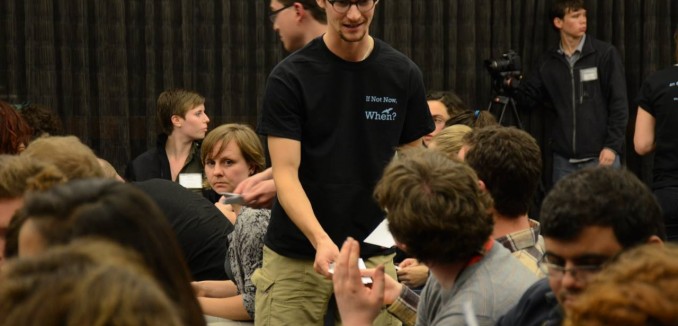A former leader in the “Open Hillel” movement who is now a critic of the organization has said that “there is no way that Open Hillel can live up to their ostensible principles,” and has called on Peter Beinart, the writer and professor who spoke at the first-ever Open Hillel conference this October, to renounce his support for the movement.
Holly Bicerano, a senior at Boston University who previously served as Open Hillel’s Campus Outreach Co-Coordinator, made the remarks in an interview with the Jewish online magazine New Voices. She had previously announced that she was quitting the movement, which is dedicated to allowing anti-Zionist and pro-BDS speakers at Hillel houses on college campuses, in a widely-read post for the Times of Israel entitled “Standing Athwart Lies.”
In her Times of Israel piece, Bicerano recounted that she wanted to invite the author Elie Wiesel to speak at the conference, but her colleagues on the Open Hillel Steering Committee rejected her suggestion, “resorting to name-calling and using curse words” against the Nobel Peace Prize-winning Holocaust survivor. She elaborated in her New Voices interview that the episode was the beginning of a “wake-up call” for her:
At the conference, I moderated the BDS panel with Dr. Sa’ed Atshan of Tufts University and Ms. Rebecca Vilkomerson of Jewish Voice for Peace (JVP). During the panel, Dr. Atshan proclaimed that all Zionists are racists. While he is entitled to say what he wants, I do not think that welcoming someone like him to berate the Jewish community would benefit us.
After the conference, I began paying attention to what SJP chapters were doing on campuses — that is, harassing and marginalizing pro-Israel students. I gradually realized that the actual effects of Open Hillel’s policies would be to harm and divide the Jewish community. The last straw was when Open Hillel formed the anti-normalization committee. I quit several weeks ago and took time to gather my thoughts before deciding to write an article in the Times of Israel. …
As a former steering committee member, I can tell you with absolute certainty that there are several organizers who want anti-normalization to be taught and implemented in Open Hillel. While they chastise Hillel for not wanting to give a platform for BDS, they reject some of the Jewish community’s most illustrious speakers, like Dr. Wiesel.
“Anti-normalization” is the belief that all forms of Israeli/Palestinian coexistence is detrimental to the Palestinian cause. In practice, this means that pro-Palestinian organizations, such as Students for Justice in Palestine (SJP), refuse to partner with pro-Israel organizations on campus. In fact, as Daniel Mael wrote in On Many Campuses, Hate is Spelled SJP, which was published in the October issue of The Tower Magazine, SJP and similar organizations go farther, intimidating Jewish and pro-Israel students and disrupting their events.
Similarly, Bicerano pointed out that Open Hillel’s claims of merely desiring open dialogue about Israel are belied by the movement’s leader’s support for anti-normalization.
There is a curious paradox about Open Hillel. On one hand, they claim that they want open dialogue. On the other hand, many of them belong to organizations like JVP and SJP. These groups regularly disrupt pro-Israel events, try to cancel pro-Israel speakers on campuses, and use guerrilla tactics such as obstructing Birthright tables. That is why there is no way that Open Hillel can live up to their ostensible principles.
In Open Hillel is a Much Bigger Problem Than You Think, published in the November issue of The Tower Magazine, assistant editor Aiden Pink described attending the Open Hillel conference, and the conflicting and contradictory statements he heard there:
[Attempting to change Hillel from within] would seem to be a counterintuitive choice for people whose political ideologies fall so far outside the Jewish mainstream, as seen in many members’ individual support for BDS and enthusiasm for a “one-state solution” (which is code for the destruction of Israel and the end of Jewish self-determination). After all, there are lots of other methods by which Jewish students can express their Jewish identities outside of Hillel’s aegis. Chabad is there if you want to engage your Jewish identity through homemade meals and Shabbat schnapps shots. Sunday schools at local synagogues are there if you want to engage your Jewish identity through helping pass on our rich religious and cultural heritage to the next generation, and make some extra money in the process. Jewish fraternities are there if you want to engage your Jewish identity through brotherhood and beer pong. Why can’t Open Hillel be there as a separate entity if you want to engage your Jewish identity through radical activism? Why can’t they just organize themselves into an alternative Jewish community, as so many splinter groups and breakaway minyanim have done in the past?
The answer, Bicerano told me, is that “people see Hillel as their Jewish home on campus, and so it’s like going to your home and not feeling totally welcome.” And indeed, Hillel International does market itself as “The Foundation for Jewish Campus Life.” Instead of abandoning Jewish communal life due to Hillel’s perceived exclusionary policies, the Open Hillel activists care enough about their Jewish “home” to work to fix its perceived errors from within. And so you end up with something paradoxical and bizarre: a group that longs for acceptance while advocating rejection, that wants Jewish life but not the version of it embodied in Jewish self-determination and statehood, that acts radical but pines for belonging.
[Photo: Gili Getz]




